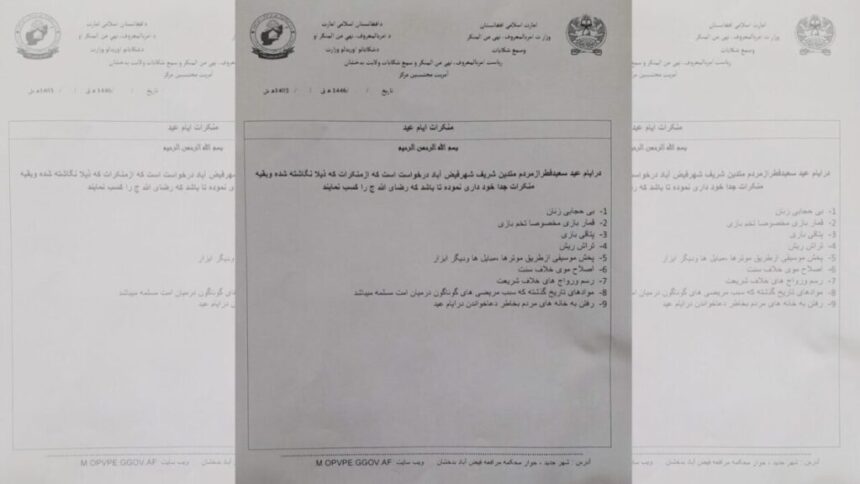RASC News Agency: As Eid al-Fitr approaches, the Taliban have imposed a new wave of restrictions in Badakhshan, further tightening their control over public and private life. The Taliban’s Ministry for the Promotion of Virtue and Prevention of Vice has issued an official decree titled “Prohibited Acts During Eid”, listing a series of banned activities. The order explicitly forbids “immoral behavior” such as women appearing in public without full hijab and the playing of music. Beyond reflecting the Taliban’s rigid religious interpretation, these restrictions appear to serve as a tool for further suppressing social freedoms and dictating personal conduct during Eid celebrations.
According to the directive, prohibited activities include:
Women appearing in public without full hijab
Playing music on mobile phones or other devices
Gambling, particularly the traditional egg-fighting game
Fireworks or any celebratory explosions
Visiting neighbors or relatives to exchange Eid greetings and prayers
Furthermore, the Taliban have also banned shaving beards, consuming expired food, getting haircuts deemed “un-Islamic,” and failing to adhere to Taliban-mandated religious customs. These restrictions align with the Taliban’s broader policy of enforcing their strict interpretation of Islamic law under the so-called “Promotion of Virtue and Prevention of Vice” program. Since reclaiming power, the group has aggressively implemented oppressive measures, including:
Mandating strict dress codes for women
Enforcing gender segregation
Banning music and cultural expressions
Shutting down beauty salons and restricting personal grooming
Censoring media and suppressing free speech
The Taliban’s draconian policies, particularly those targeting women and personal freedoms, have provoked widespread condemnation from human rights activists and Afghan citizens alike. Many perceive these restrictions as a resurgence of the group’s oppressive rule from the 1990s, aimed at systematically dismantling individual rights and silencing opposition.
While the Taliban justify these measures as necessary for preserving “Islamic order” and upholding Sharia, critics argue that they serve as instruments of repression, designed to tighten the Taliban’s grip on society and eliminate any form of dissent.






